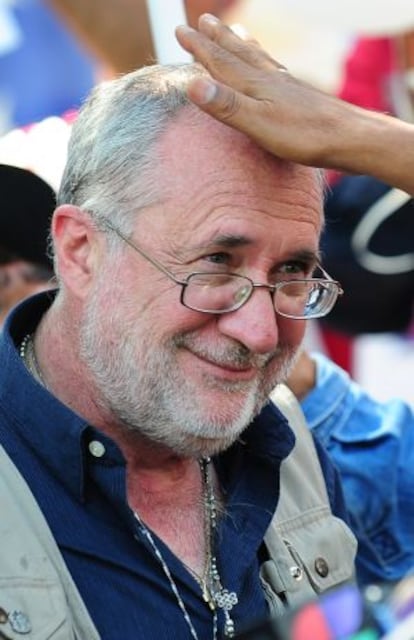Violent week in Mexico culminates in murder of incoming mayor
Poet Sicilia begins campaign across US asking Americans to change drug laws

The number of murders across Mexico has continued to escalate over the past week in various parts of the country, including the assassinations of a mayor-elect and his campaign manager in the northern state of San Luis Potosí. On Tuesday, President Felipe Calderón ordered 15,000 troops and police to seven states to beef up security.
Édgar Morales Pérez won the July 1 election to serve as mayor of the town of Matehuala on behalf of the Institutional Revolutionary Party (PRI). Morales Pérez and his campaign manager, Juan Francisco Hernández Colunga, were returning from a family get-together when emergency services were told by phone at 2am that two men were wounded.
According to the San Luis de Potosí attorney general's office, police found .223-calibre bullet casings near the vehicle they were driving. Hernández Colunga's wife was also in the vehicle but survived the attack.
The PRI has condemned the assassinations and demanded a full investigation.
The state of San Luis de Potosí is governed by the PRI, but Morales Pérez was able to wrest control of Matehuala after years of National Action Party (PAN) domination in the town. He was slated to take office in October, two months before PRI leader Enrique Peña Nieto is sworn in as Mexico's new president. Sunday's murders were just the latest in a rash of political killings - suspected drug-related homicides - that have been taking place in towns and cities in San Luis de Potosí and the nearby states of Nueva León, Tamaulipas and Veracruz.
Violence against local politicians has also extended to other areas. On August 5, in Guerrero state, on the other side of Mexico, the mayor of Tecpán de Galeana, Nadín Torralba Mejía, was kidnapped by an unknown gang. Her whereabouts are unknown.
Frustration at surge
In the municipality of Manlio Fabio Altamirano, in Veracruz, authorities found six members of a family murdered at their ranch, including three children who had been decapitated. In Zacatecas police found 12 bodies inside an abandoned vehicle.
Frustration among Mexicans over the surge in violence across the country has prompted calls for changes in policy in the way the government is handling the war against the cartels. There is also a growing movement in the country to demand that the United States to change its anti-drug policies.
"We are going to tell United States citizens that behind their addicts and the declared war by their government are our dead loved ones and family members who have disappeared," said Javier Sicilia, the poet who has become a leader of a growing pacifist movement against the violence since his son was murdered in March 2011.
Sicilia has organized an unprecedented traveling campaign that has embarked on a cross-country journey from San Diego, California, headed for Washington DC, with stops in more than 20 cities. Called the Caravan for Peace, some 110 people are taking part, including 54 victims who have been directly affected by the Mexican drug war.
"This war is putting our democracy in jeopardy," he said. "We need to attack this problem at the roots and construct peace because if we don't, we will lose our nation and our rights."
The drug conflict has claimed 70,000 lives and an additional 20,000 others have disappeared since 2006, the year in which President Calderón declared war on the cartels.
Tu suscripción se está usando en otro dispositivo
¿Quieres añadir otro usuario a tu suscripción?
Si continúas leyendo en este dispositivo, no se podrá leer en el otro.
FlechaTu suscripción se está usando en otro dispositivo y solo puedes acceder a EL PAÍS desde un dispositivo a la vez.
Si quieres compartir tu cuenta, cambia tu suscripción a la modalidad Premium, así podrás añadir otro usuario. Cada uno accederá con su propia cuenta de email, lo que os permitirá personalizar vuestra experiencia en EL PAÍS.
¿Tienes una suscripción de empresa? Accede aquí para contratar más cuentas.
En el caso de no saber quién está usando tu cuenta, te recomendamos cambiar tu contraseña aquí.
Si decides continuar compartiendo tu cuenta, este mensaje se mostrará en tu dispositivo y en el de la otra persona que está usando tu cuenta de forma indefinida, afectando a tu experiencia de lectura. Puedes consultar aquí los términos y condiciones de la suscripción digital.








































